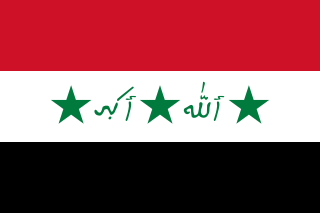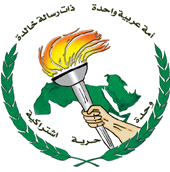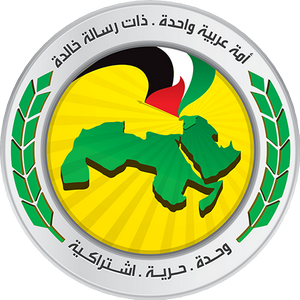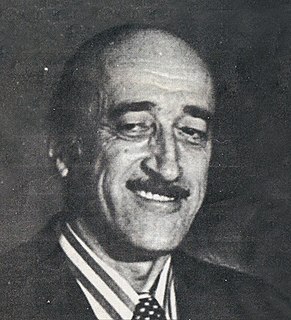
The Arab Socialist Baʿath Party was a political party founded in Syria by Mishel ʿAflaq, Ṣalāḥ al-Dīn al-Bītār, and associates of Zaki al-ʾArsūzī. The party espoused Baʿathism, which is an ideology mixing Arab nationalist, pan-Arabism, Arab socialist, and anti-imperialist interests. Baʿathism calls for unification of the Arab world into a single state. Its motto, "Unity, Liberty, Socialism", refers to Arab unity, and freedom from non-Arab control and interference.

Michel Aflaq was a Syrian philosopher, sociologist and Arab nationalist. His ideas played a significant role in the development of Ba'athism and its political movement; he is considered by several Ba'athists to be the principal founder of Ba'athist thought. He published various books during his lifetime, the most notable being The Battle for One Destiny (1958) and The Struggle Against Distorting the Movement of Arab Revolution (1975).
The National Progressive Front is a political alliance of parties in Syria that supports the Arab nationalist orientation of the government and accepts the "leading role" of the Arab Socialist Ba’ath Party, the largest party in the NPF.

A referendum to confirm the presidential candidate Bashar al-Assad was held in Syria on 27 May 2007, after the People's Council of Syria unanimously voted to propose the incumbent for a second term on 10 May 2007.
The 1966 Syrian coup d'état refers to events between 21 and 23 February during which the government of the Syrian Arab Republic was overthrown and replaced. The ruling National Command of the Arab Socialist Ba'ath Party were removed from power by a union of the party's Military Committee and the Regional Command, under the leadership of Salah Jadid.

The Ramadan Revolution, also referred to as the 8 February Revolution and the February 1963 coup d'état in Iraq, was a military coup by the Ba'ath Party's Iraqi-wing which overthrew the Prime Minister of Iraq, Abd al-Karim Qasim in 1963. It took place between 8 and 10 February 1963. Qasim's former deputy, Abdul Salam Arif, who was not a Ba'athist, was given the largely ceremonial title of President, while prominent Ba'athist general Ahmed Hassan al-Bakr was named Prime Minister. The most powerful leader of the new government was the secretary general of the Iraqi Ba'ath Party, Ali Salih al-Sa'di, who controlled the National Guard militia and organized a massacre of hundreds—if not thousands—of suspected communists and other dissidents following the coup.

Ba'athist Iraq, formally the Iraqi Republic until 6 January 1992 and the Republic of Iraq thereafter, covers the national history of Iraq between 1968 and 2003 under the rule of the Arab Socialist Ba'ath Party. This period began with high economic growth and soaring prosperity, but ended with Iraq facing social, political, and economic stagnation. The average annual income decreased both because of external factors and the internal policies of the Iraqi government.
The National Progressive Front was an Iraqi popular front announced on 16 July 1973 and constituted in 1974, ostensibly formed within the framework of a "joint action programme" to establish a coalition between the Arab Socialist Ba'ath Party, the Iraqi Communist Party, the Kurdistan Revolutionary Party, a pro-government section of the Kurdistan Democratic Party, and miscellaneous independents. The Iraqi Communist Party were removed from the NPF in 1979 while the Kurdish Democratic Party suffered restrictions when Saddam Hussein came to power after 1979. The creation of the Front ensured the leading role of the Ba'athists in state and society whilst allowing limited autonomy for other participating parties loyal to the government. Saddam spoke of it once as "one of the essential forms to voice our will and to deepen democracy and political participation of the people and the national forces in building the new experiment in all fields." In effect the Front was controlled and maintained solely by the Ba'ath, with all other legal political forces acting in subservience to it.

Parliamentary elections were held in Syria on 7 May 2012 to elect the members of the Syrian People's Council. The elections followed the approval of a new constitution in a referendum on 26 February 2012.

The Arab Socialist Ba'ath Party, also referred to as the pro-Iraqi Ba'ath movement, is a Ba'athist political party which was headquartered in Baghdad, Iraq until 2003. It is one of two parties which emerged from the 1966 split of the original Ba'ath Party.

The Arab Socialist Ba'ath Party, also referred to as the pro-Syrian Ba'ath movement, is a neo-Ba'athist political party with branches across the Arab world. The party emerged from a split in the Ba'ath Party in February 1966 and leads the government in Syria. From 1970 until 2000, the party was led by the Syrian president Hafez al-Assad. As of 2000, leadership has been shared between his son Bashar al-Assad and Abdullah al-Ahmar. The Syrian branch of the party is the largest organisation within the Syrian-led Ba'ath Party.

The Arab Socialist Ba'ath Party – Iraq Region, officially the Iraqi Regional Branch, is an Iraqi Ba'athist political party founded in 1951 by Fuad al-Rikabi. It was the Iraqi regional branch of the original Ba'ath Party before changing its allegiance to the Iraqi-dominated Ba'ath movement following the 1966 split within the original party. The party was officially banned following the American invasion of Iraq in 2003, but despite this it still continues to function underground.

The November 1963 Iraqi coup d'état took place between November 13 and November 18, 1963, when, following internal party divisions, pro-Nasserist Iraqi officers led a military coup within the Ba'ath Party. Although the coup itself was bloodless, 250 people were killed in related actions.
Local elections were held across Syria on 12 December 2011 to elect 17,629 councillors in 1,355 administrative units. Some 42,000 candidates contested the elections. The election took place on the second day of an opposition called general strike, with the Arab and Kurdish opposition boycotting the election. The Syrian government claimed the elections were a success and enjoyed a high turnout, however turnout in many parts of the country was seen as low.

The Arab Socialist Ba'ath Party – Syria Region, officially the Syrian Regional Branch, is a neo-Ba'athist organisation founded on 7 April 1947 by Michel Aflaq, Salah al-Din al-Bitar and followers of Zaki al-Arsuzi. It was first the regional branch of the original Ba'ath Party (1947–1966) before it changed its allegiance to the Syrian-dominated Ba'ath movement (1966–present) following the 1966 split within the original Ba'ath Party. The party has ruled Syria continuously since the 1963 Syrian coup d'état which brought the Ba'athists to power.

Munif al-Razzaz was a Jordanian-Syrian physician and politician who was the second, and last, Secretary General of the National Command of the Arab Socialist Ba'ath Party, having been elected to the post at the 8th National Congress held in April 1965.

The Central Command of the Arab Socialist Ba'ath Party, which was established through the merger of the National Command of the Arab Socialist Ba'ath Party and the Regional Command of the Syrian Regional Branch of the Arab Socialist Ba'ath Party in 2018, is the ruling organ of the Ba'ath Party organization in Syria and the Syrian-led Ba'athist movement. Its former, Regional Command, stems from Ba'athist ideology, where region literally means an Arab state. According to the Syrian Constitution, the Central Command has the power to nominate a candidate for president. While the constitution does not state that the Secretary-General of the Central Command is the President of Syria, the charter of the National Progressive Front (NPF), of which the Ba'ath Party is a member, states that the President and the Secretary-General is the NPF President, but this is not stated in any legal document. The 1st Extraordinary Regional Congress held in 1964 decided that the Secretary-General of the Central Command would also be head of state. Amin al-Hafiz, the incumbent secretary, became head of state and retained his post as Prime Minister.

This article details the history of the Syrian Regional Branch of the Ba'ath Party.
Parliamentary elections were held in Syria to elect the People's Council on 13 April 2016, electing members for the 2016–2020 parliamentary term.

Parliamentary elections were scheduled to be held in Syria on 13 April 2020 to elect members of the People's Council of Syria. However, on 14 March they were postponed to 20 May due to the coronavirus pandemic. On 7 May, it was decided to postpone the elections until 19 July. Syria's parliamentary elections occur every four years, with the last held in 2016.









